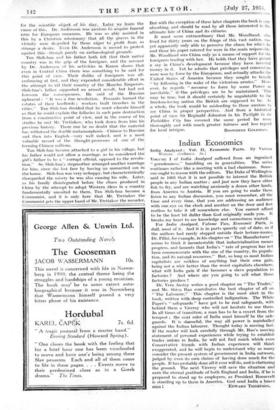Indian Economics
VOLUME I of India Analysed suffered from an ingrained " gormlessness," bumbling on in generalities. The series continues rather like a meeting with a bad chairman. Some- one ought to reason With the editors. The Duke of Wellington said in 1805 that it is not possible to interest the British people in any Indian matter ; and just now they have other fish to fry, and are watching-anxiously a dozen other lands, from America to Austria. If you are going to make them listen to any Indian discussion, you must remember, all the time and every time, that you are addressing an audience with one eye on the clock and another on the door and feet restless to -take it off -somewhere else. You cannot -afford to be the least bit duller than God originally made -you. It breaks my heart to see knowledge and earnestness wasted. For India Analysed, Volume Two, Economic Patti, is dull, most of it. And it is in parts queerly out of date, as if the authors had rarely stepped outside their lecture-rooms. Dr. Pillai, for example, in his chapter on " The Manufacturer " seems to think it incontestable that industrialization means progress, and laments that India's " rate of progress has not been commensurate with the size of the country, its popula- tion, and its naturaal resources." But, so long as most Indian capitalists are reckless of anything but their own gain, being not a whit better than the worst capitalists elsewhere, what will India gain if she becomes a slave population in factories ? And where ate you going to sell. what those factories produce ?
Dr. Vera Anstey writes a good chapter on " The Trader," and Mr. Shiva Rao contributes the best chapter of all on " The Labourer." This chapter is the' most alert • in the book, written with:deep controlled indignation. The White Paper's " safeguards " have 'got to be real safeguards, with behind them a Viceroy who will not hesitate to use them. In all times of transition, a man has to be a covert from the tempest ; the next ruler of India must himself be the safe- guards. It is shameful,- the way all power- is maishalled against the Indian labourer. Thought today is moving fast. If the reader will look carefully through Mr. Rao's moving statement of personal experiences while trying to establish trades unions in India, he will not find much 'which even Conservative friends with Indian experience will ".think exaggerated, and he will begin to understand why so many consider the present system of government in India outworn, judged by even its own claims of having done much for the people. It has probably done all it ever will do, and is cluttering the ground. The next Viceroy will save the situation and earn the eternal gratitude, of both England and India, if he is prepared to stand up to employers, as President Roosevelt is standing up to them in America. God send India a brave


































 Previous page
Previous page